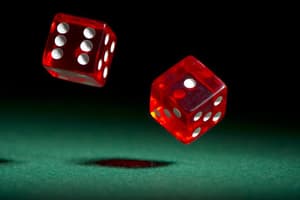Podcast
Questions and Answers
What is the numerical study of chances of occurrence of events called?
What is the numerical study of chances of occurrence of events called?
Probability theory
How many approaches to probability are discussed in the text?
How many approaches to probability are discussed in the text?
- Two (correct)
- Three
- One
- Four
What is an operation that produces some well-defined outcomes called?
What is an operation that produces some well-defined outcomes called?
Experiment
When repeated under identical conditions, what type of experiment consistently produces the same result or outcome?
When repeated under identical conditions, what type of experiment consistently produces the same result or outcome?
A random experiment produces the same outcome every time it is repeated under identical conditions.
A random experiment produces the same outcome every time it is repeated under identical conditions.
What is the set of all possible outcomes of a trial (random experiment) called?
What is the set of all possible outcomes of a trial (random experiment) called?
What is a subset of a sample space called?
What is a subset of a sample space called?
What is an event that contains only a single sample point called?
What is an event that contains only a single sample point called?
What are events obtained by combing together two or more elementary events called?
What are events obtained by combing together two or more elementary events called?
Events are equally likely if they are independent.
Events are equally likely if they are independent.
What type of event prevents the occurrence of all other events?
What type of event prevents the occurrence of all other events?
What are events called that are not mutually exclusive?
What are events called that are not mutually exclusive?
What are events called where the happening (or non-happening) of one event does not affect the happening (or non-happening) of others?
What are events called where the happening (or non-happening) of one event does not affect the happening (or non-happening) of others?
What are events called when the happening of one event affects (partially or totally) another event?
What are events called when the happening of one event affects (partially or totally) another event?
Independent events are always taken from a single experiment.
Independent events are always taken from a single experiment.
Mutually exclusive events can happen together.
Mutually exclusive events can happen together.
The word "and" connects independent events but the word "or" connects mutually exclusive events.
The word "and" connects independent events but the word "or" connects mutually exclusive events.
Flashcards
Probability
Probability
The numerical study of the likelihood of an event occurring.
Random Experiment
Random Experiment
An experiment where repeated trials under identical conditions do not produce the same outcome each time.
Sample Space
Sample Space
The set of all possible outcomes of a random experiment.
Event
Event
Signup and view all the flashcards
Classical Probability
Classical Probability
Signup and view all the flashcards
Independent Events
Independent Events
Signup and view all the flashcards
Mutually Exclusive Events
Mutually Exclusive Events
Signup and view all the flashcards
Study Notes
Probability
- Probability is the numerical study of the chances of events occurring.
- It is applied in various fields to provide approximate tools.
- Two main approaches to probability:
- Classical approach
- Axiomatic approach
Experiment Types
-
Deterministic experiment: An experiment that always produces the same outcome when repeated under the same conditions. Examples include scientific experiments that yield the same results consistently.
-
Random experiment: An experiment where repeated trials under identical conditions don't always produce the same outcome. The outcome of a single trial is uncertain, but the possible outcomes are known in advance. Examples include coin flips, dice rolls, and drawing cards from a deck.
Definitions of Terms
- Sample Space (S): The set of all possible outcomes of a random experiment.
- Event (E): A subset of the sample space. A simple event contains only one outcome, while a compound event results from combining multiple outcomes.
- Simple Event/Elementary Event: An event consisting of a single sample point in the sample space.
- Compound Event: Combining two or more simple events.
Types of Events
- Equally Likely Events: Events that have an equal chance of occurring. For instance, in a fair die roll, each number from 1 to 6 is equally likely.
- Mutually Exclusive Events: If the occurrence of one event prevents the occurrence of the other(s). Example: Rolling a 6 on a six-sided die prevents rolling any other number.
- Mutually Non-Exclusive Events: Events that can occur together. For example, obtaining a "2" and an even number on a die roll isn't mutually exclusive.
- Independent Events: The outcome of one event does not affect the outcome of another. For example, tossing two coins: the outcome of one coin toss is unrelated to the other.
- Dependent Events: Events where the outcome of one affects the outcome of another. Example: Drawing two cards from a deck without replacement - the second card's probability depends on what was drawn first.
Classical Definition of Probability
- Probability of an event = (Number of favorable outcomes) / (Total number of possible outcomes)
- Probability is always between 0 and 1. An impossible event has a probability of 0, and a certain event has a probability of 1.
Other Concepts
- Odds in Favour/Odds Against an Event: Odds of an event are based on favourable outcomes vs unfavourable outcomes.
- Combinations and Permutations: used to solve problems involving arranging and selecting items.
Specific Examples/Problem Types
- Coin tosses: Outcomes are typically heads or tails.
- Dice rolls: Each roll can produce an outcome from 1 to 6.
- Playing cards: Standard 52-card decks involve suits and ranks.
- Probability of a person getting a sequence: Related to combinations and sequences of events.
Studying That Suits You
Use AI to generate personalized quizzes and flashcards to suit your learning preferences.




